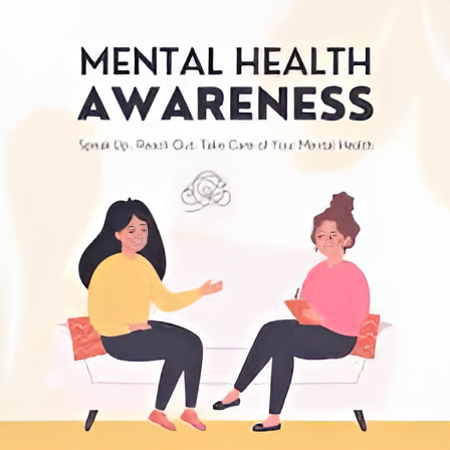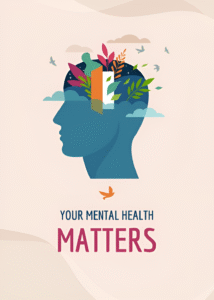
Despite being equally as vital as physical health, Mental Health Awareness frequently doesn’t get the attention it needs. Regardless of age, gender, or background, millions of individuals worldwide suffer from mental health issues ranging from stress and anxiety to despair and trauma.
Creating a culture that prioritizes emotional well-being, encourages candid discussions, and offers help without passing judgment requires increasing understanding of mental health issues.

💡 What Is Mental Health?
Our emotional, psychological, and social well-being are all components of mental health. It influences our thoughts, emotions, behaviors, stress management, interpersonal relationships, and decision-making.
Having a healthy mind enables us to:
- Handle the difficulties of life.
- Continue to have wholesome interactions
- Continue to be productive at work or school.
- Have fun and maintain emotional equilibrium.
📊 Alarming Statistics
- Around the world, 1 in 8 persons suffer from a mental illness (WHO, 2023).
- Globally, depression is the primary cause of disability.
- The fourth most common cause of mortality for people aged 15 to 29 is suicide.
These numbers highlight the critical need to increase mental health care availability and awareness.
🔍 Common Mental Health Conditions
1. Anxiety Disorders
feelings of extreme anxiety or terror, frequently accompanied by physical manifestations such as shaking, sweating, and a fast heartbeat.
2. Depression
persistent melancholy, boredom, exhaustion, and a sense of inadequacy. It may impede day-to-day activities.
3. Bipolar Disorder
severe mood fluctuations, from manic highs to depressed lows.
4. Post-Traumatic Stress Disorder (PTSD)
caused by stressful events; symptoms include emotional numbness, nightmares, and flashbacks.
5. Obsessive-Compulsive Disorder (OCD)
Repetitive behaviors (compulsions) and recurring thoughts (obsessions) that disrupt day-to-day functioning.
💬 Why Mental Health Awareness Matters
✔️ Reduces Stigma
Open communication regarding mental health contributes to its normalization. It encourages people to ask for assistance without worrying about being judged.
✔️ Encourages Early Intervention
Awareness increases the likelihood of recovery by assisting in the early detection of symptoms.
✔️ Promotes Healthier Communities
Prioritizing mental health makes communities more resilient, caring, and supportive.
❤️ How to Support Mental Health
For Yourself:
Take care of yourself by getting enough sleep, eating a healthy diet, and exercising frequently.
Utilize breathing techniques, journaling, or meditation to manage stress.
Speak to Someone: Don’t be afraid to share your feelings with a friend, relative, or therapist.
Steer clear of substance abuse because drugs and alcohol can exacerbate mental health conditions.
Limit Social Media: Limit exposure to negativity and comparison.
For Others:
-
Listen Without Judgment
-
Offer Support, Not Solutions
-
Encourage Professional Help
-
Learn About Mental Health
-
Respect Their Journey
🧘 Simple Daily Habits for Mental Wellness
- Be thankful as you begin your day.
- While working, take brief pauses.
- Take a stroll in the outdoors.
- Establish attainable objectives.
- One hour before to going to bed, unplug from screens.
🏥 When to Seek Professional Help
A mental health expert should be consulted if you:
- Feel hopeless or overwhelmed all the time.
- Have mood swings or panic episodes.
- have difficulty eating or sleeping.
- Avoid social situations.
- Consider suicide or self-harm.
Remember that asking for assistance is a show of strength rather than weakness.
For more Information : Health tips , Entertainment, food Technology







